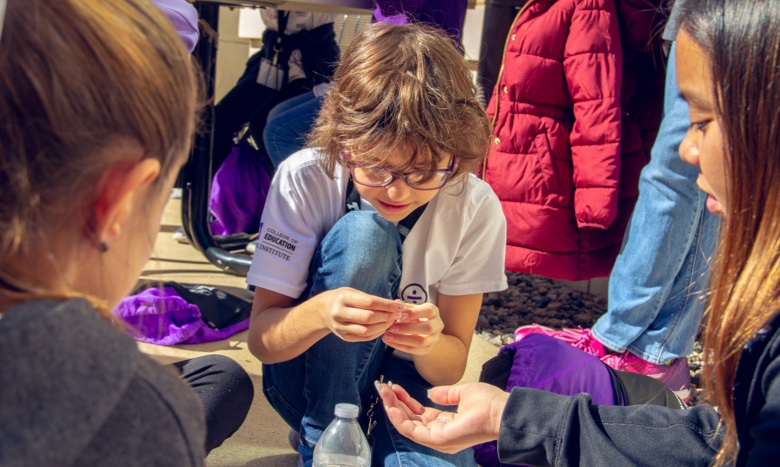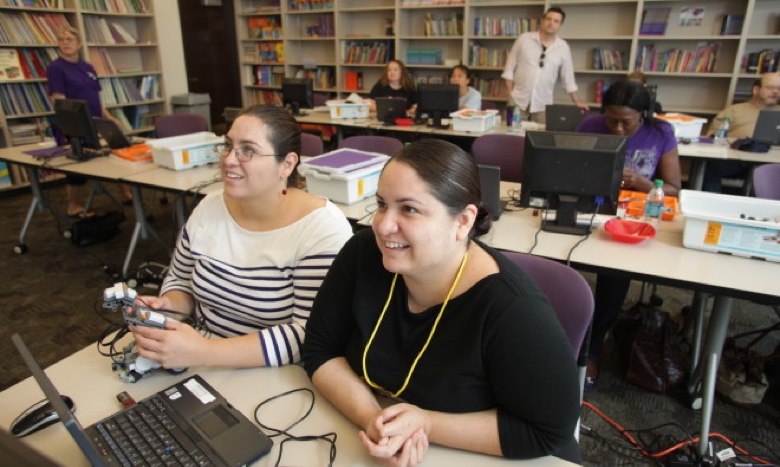Outreach

Being a citizen of the Fort Worth community and beyond is an important part of the Andrews Institute. We reach out to adults who are teaching children through professional development workshops, to K-12 students through our student engagements, and to the greater community through lectures and sponsored events.

The Andrews Institute is pleased to be able to offer both one-time, afternoon/evening workshops as well as sustained, long-term workshops for teachers. The availability of workshops depends on the extent of external funding.
Cost: Funding by external sources makes it possible to present workshops each semester free of charge. Registration will usually be accepted until maximum enrollment has been achieved in each workshop. Please note that there is a minimum number of participants required in order to fund these workshops and a re-confirmation email will be sent out at least three days prior to the event.
CPE Credit: Teachers will be awarded continuing professional education (CPE) credit hours for each workshop attended.
The Andrews Institute is invested in providing K-12 students with the opportunity to work with scientists, mathematicians and educators at TCU. Through grants provided by the Andrews Institute, TCU faculty are able to pursue their research project and provide outreach to K-12 students in the form of workshops, camps, and other educational programs. To learn more about some of Andrews Institute funded research projects, please check out the list shared below.
Paschal High School Turtle Survey
Andrew Brinker, Paschal High School
This project provides high school students with an innovative educational experience, while also gaining insight into the population dynamics and ecology of the turtles living in the Trinity River. Students and faculty from Paschal High School and TCU sample turtles monthly in the Trinity River, mainly north of TCU, where the river crosses underneath the South University Drive. The group traps and observes map turtles, sliders, cooters and musk turtles as well as snapping turtles/softshells. The group will weigh, measure (carapace, plastron lengths and widths), hard mark on the marginal scutes, and PIT tag the turtles prior to releasing them back into the river. Softshell turtles are be tattooed on their ventral sides as shell notching isn’t possible. Science education doctoral candidate Shelly Wu and master’s student/PHS teacher Brook Salazar will research how the experience influences the high school students.
TCU Bat Monitoring Program
Dr. Victoria Bennett, TCU College of Science & Engineering
Sustainable Seafood Initiative in Peru: Exploring Assumptions
Danielle Biffi, Science Education Ph.D. Candidate
Peru is experiencing a “gastronomic boom” that is increasing the demand for seafood. Based on the idea that consumers have the power to reduce the demand of endangered species, several market-based initiatives have been created to inform consumers about sustainable choices.
The team will investigate two implicit assumptions that consumer-based initiatives hold: that the fish recommended is healthy for consumers and that the fish are not mislabeled. They will test these assumptions by collecting fish samples from markets and restaurants. Lastly, they will determine their mercury content and sequence their DNA in order to identify the fish species.
TCU Horny Toad Project
Dean Williams, TCU College of Science & Engineering
Chemistry Connections
Kayla Green, TCU College of Science & Engineering